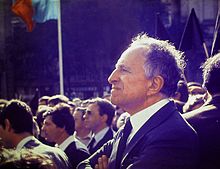Vasco Gonçalves
Vasco dos Santos Gonçalves [ ˈvaʃku duʃˈsɐntuˈ gõˈsalv anhören ] (born May 3, 1921 in Lisbon , † June 11, 2005 in Almancil in the Algarve ) was a Portuguese general and politician .
Life
Gonçalves served in the military in what was then Portuguese India ( Velha Goa ) in 1955 and 1956 , in Mozambique between 1966 and 1967 and in Angola from 1970 to 1971 . There he achieved the rank of colonel . As a politically interested person who prepared private economic studies, he was open to social questions.
He was one of the leading figures in the Movimento das Forças Armadas (MFA), which called for an end to the colonial wars in the African overseas provinces of Portugal. In 1973 Gonçalves, then a colonel, joined the captains' movement . On April 25, 1974 the officers of the so-called Carnation Revolution overthrew the government of the dictator Marcelo Caetano without bloodshed thanks to the broad support of the population .
Gonçalves served from July 18, 1974 to September 19, 1975 as Prime Minister of the Provisional Government and successor to Adelino da Palma Carlos . He headed three cabinets. From September 1974 to February 1975 he also served as Minister of Defense and Information. The main points of his political agenda were land reform , the nationalization of the most important private means of production, banks and insurance companies, the introduction of minimum wages and a 13th month salary. Under his government, Portugal dissolved its colonial empire and released the African colonies of Guinea-Bissau , Angola , Mozambique , São Tomé and Príncipe and the Cape Verde Islands into independence. Gonçalves temporarily called for council democracy .
One of his most important opponents was Mário Soares , who initially belonged to several Gonçalves cabinets as foreign minister and later became president. But he also saw himself as an opponent of the minister and general secretary of the Communist Party (PCP) Álvaro Cunhal .
Gonçalves belonged to the wing of the revolutionaries, which was close to the PCP. In the summer of 1975 he had become a member of the triple board, but was the target of severe attacks by Ernesto Melo Antunes from the MFA, the Partido Socialista around Mário Soares and the Catholic Church. In the fall of 1975, the Gonçalves group lost its political influence in the revolutionary movement. In September 1975 he was expelled from the Supreme Revolutionary Council. After that he was temporarily head of the military academy. In February 1976 he was given final retirement.
On June 11, 2005, Gonçalves died at the age of 84 while bathing in his brother's swimming pool in the village of Almancil in the Algarve as a result of cardiac syncope .
Quotes
“You are either for the revolution or for the reaction! There is no third way ... "
See also
Individual evidence
- ↑ Person encyclopedia Quem é Quem - Portugueses Célebres. 1st edition, Temas & Debates, Lisbon 2009, page 258 ( ISBN 978-989-644-047-3 )
| predecessor | Office | successor |
|---|---|---|
| Adelino da Palma Carlos |
Prime Minister of Portugal 1974–1975 |
José Baptista Pinheiro de Azevedo |
| personal data | |
|---|---|
| SURNAME | Gonçalves, Vasco |
| ALTERNATIVE NAMES | Gonçalves, Vasco dos Santos (full name) |
| BRIEF DESCRIPTION | Portuguese general and politician |
| DATE OF BIRTH | May 3, 1921 |
| PLACE OF BIRTH | Lisbon |
| DATE OF DEATH | June 11, 2005 |
| Place of death | Almancil , Algarve |
